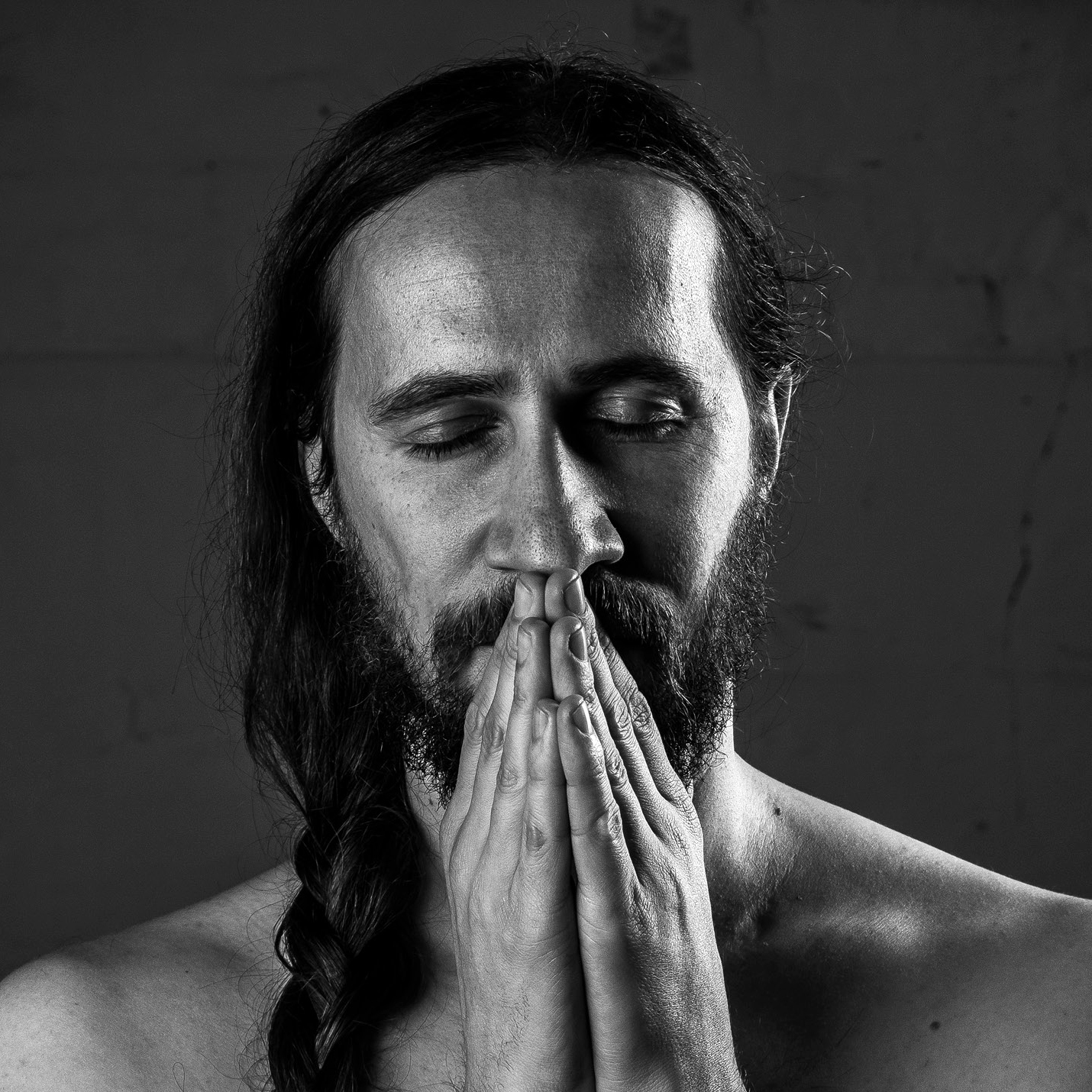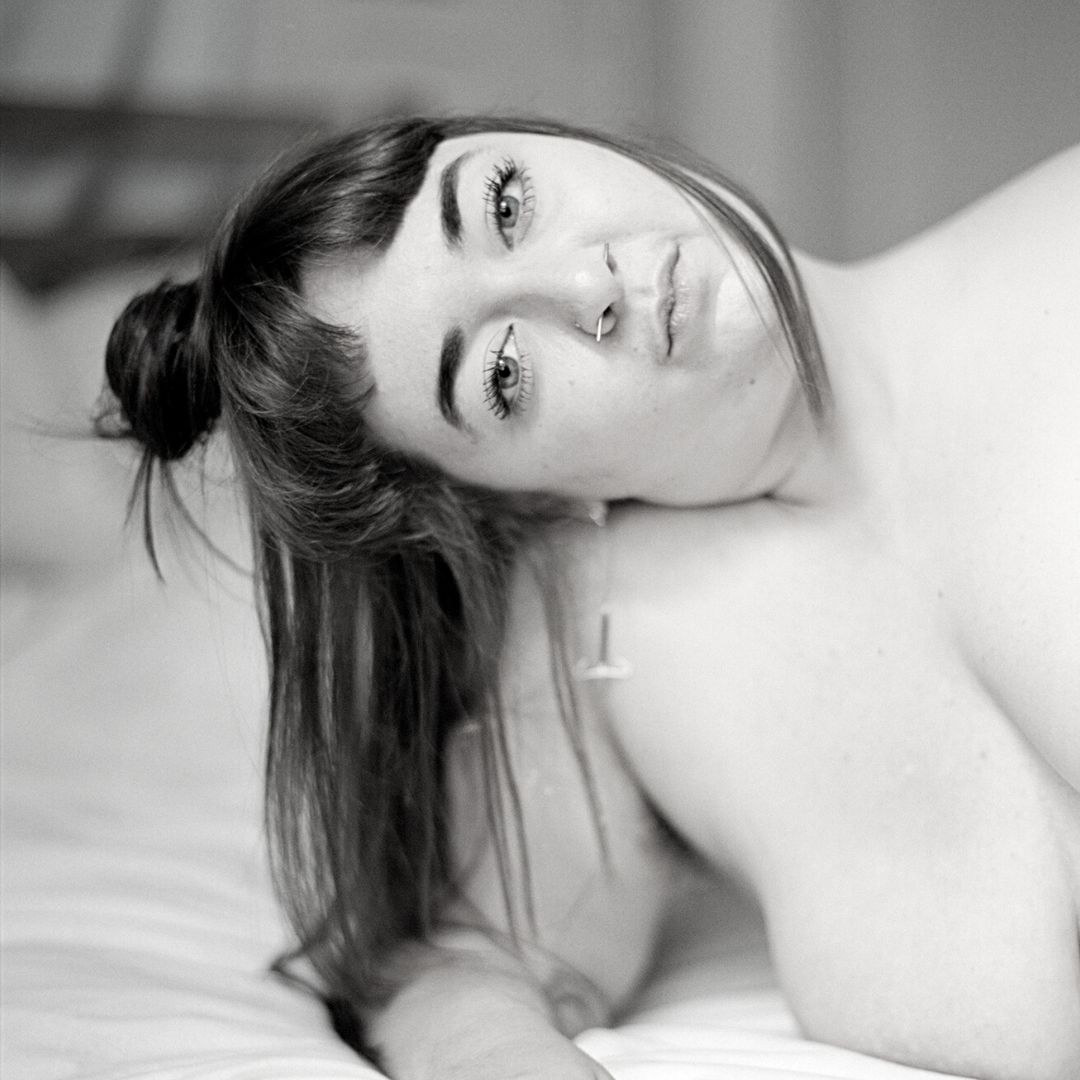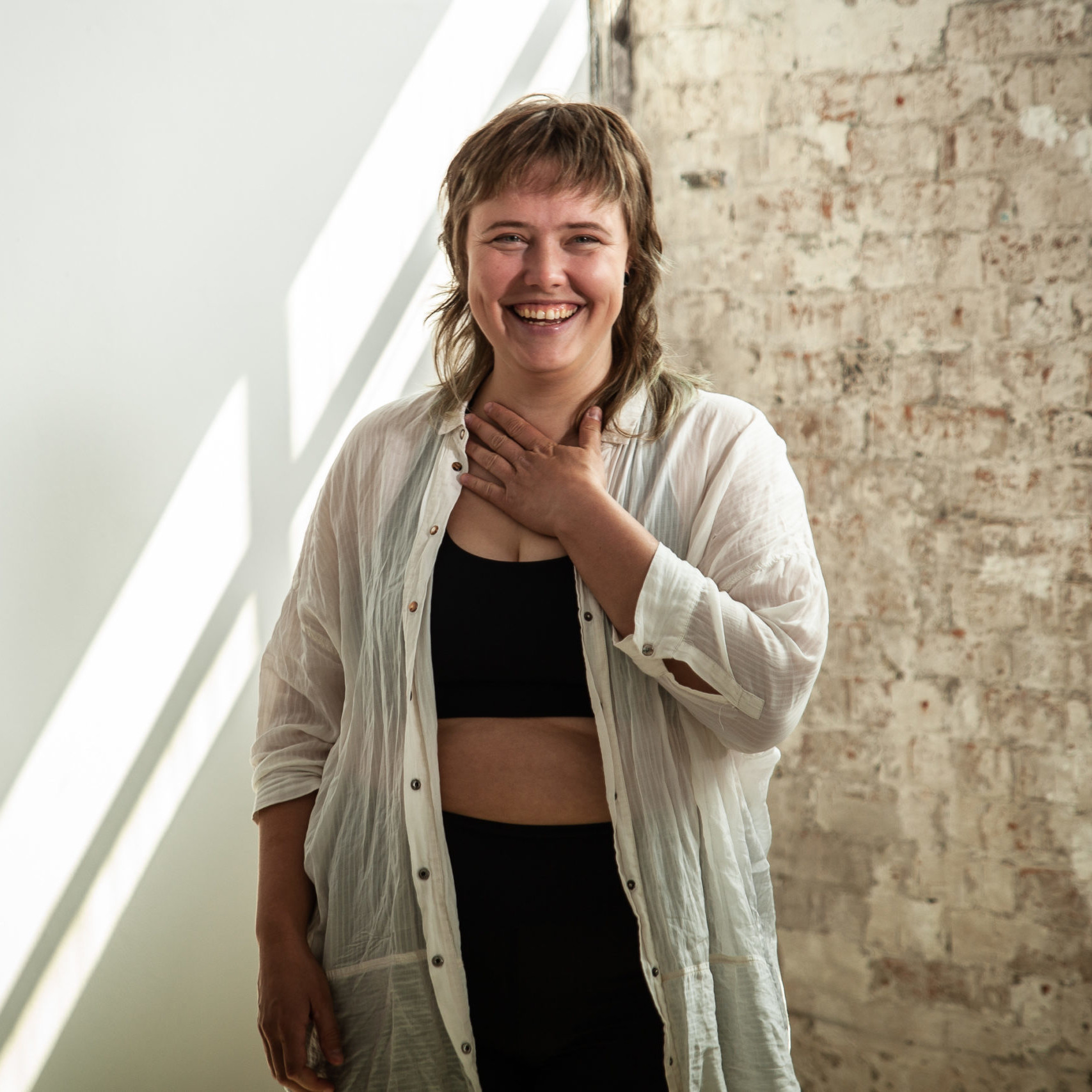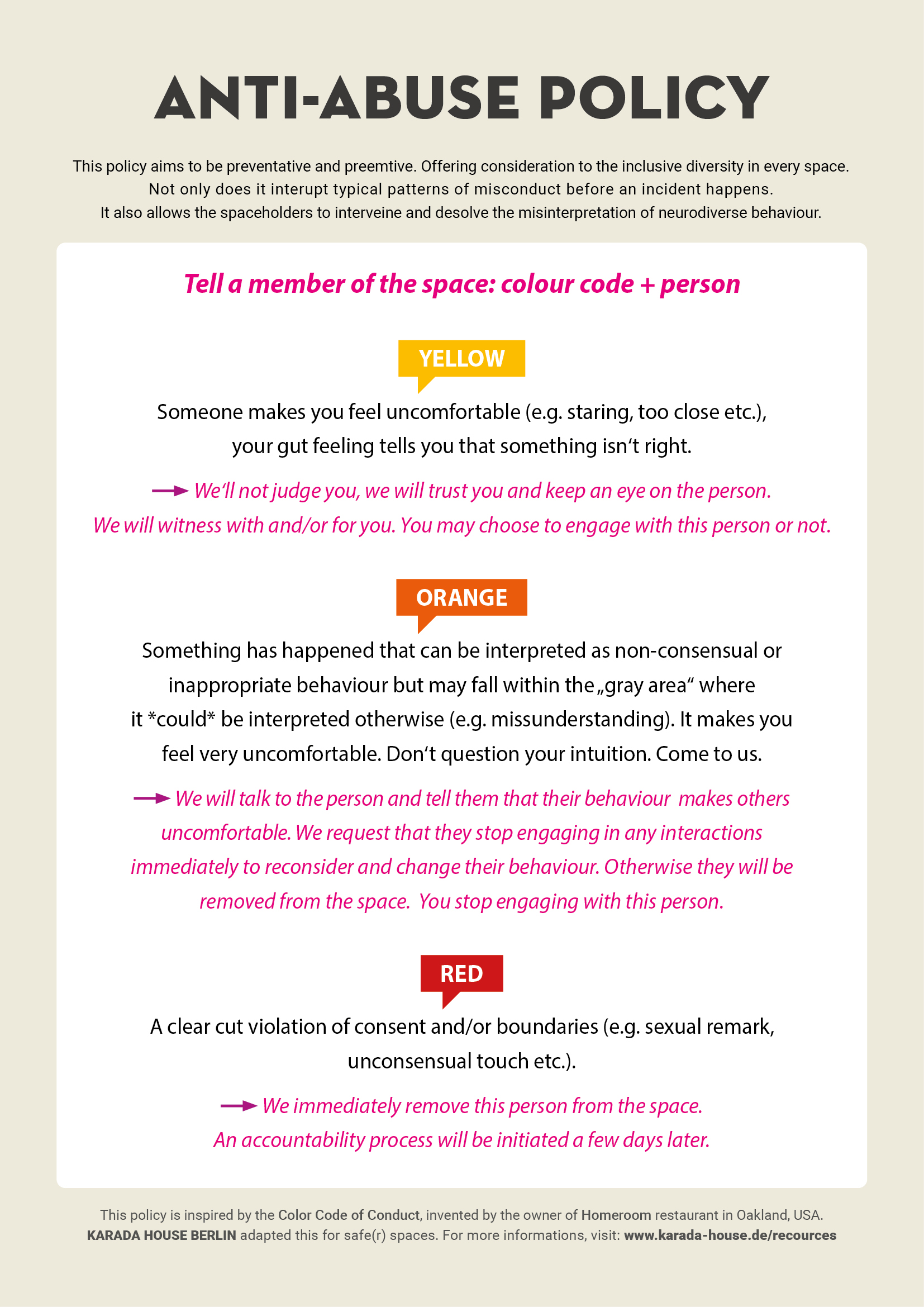ABOUT US
Karada House is a queer collaborative art space that researches the boundaries, intersectionalities and politics of body, art and the multitude of interactions between them. Karada (体) is the Japanese word for body and translates in its literal form to “root of a person”. We respect, celebrate and explore the variety of gender and sexual expressions and identifications. Karada House is a body-positive open space based on collaboration, informed consent and respectful communication.
Who we are

Caritia’s fascination with the root/the body stems from a longing to deeply ‘listen’ to (her) body holistically, from the inside out. Passionately (and patiently) empathetic and fantastically flawed, boundaries and self-care are the guiding principles that keep this weaver of magik casting spells. Imbued with an Aquarian nature to embrace change and strive to empower others, Caritia remains in lofty utopias around the desire to let go of that which does not align with one’s highest good. Transformative states are acts of activism to Caritia. To create with/through/for the body is the greatest gift to this BIPOC, soulfully spiritual, fluid energy in femme form, educator, coach, performer, safe(r) space curator, and introverted mischief maker.

Beatrice (they/them) is a non-binary queer person who is driven (and haunted) by being an unapologetic fire sign (Aries! Run for your lives!). They are an artist and academic working mostly with film, image, storytelling, and the body. They see themselves as a constant student and derive their knowledge from many different sources. They are interested in how the body influences perception, witnessing rituals, and transformative body processes that allow for trauma work. They are currently studying to become a therapist.

René (she/her) is a visual artist whose work is deeply rooted in the exploration of the human body, both from aesthetic and political viewpoints. Her art is a constant questioning of established norms surrounding identity, gender, sexuality, and societal taboos. René brings a calm and soothing presence to her work.
What sets René apart is her intuitive approach and her keen sensitivity to the sensations and emotions that come into play during human interactions. She finds inspiration in the profound vulnerability and insecurities within herself, seeing them as powerful assets that not only contribute to her personal growth but also have the ability to profoundly touch and move people through her art.

Almond (she/they) is a queer, disabled sex educator and ritual facilitator. Living in a fat, chronically painful, neurospicy, white, genderqueer body – somewhere between Berlin and Anishinabewaki territory in so-called Canada. Almond’s anchored (and often hyper-focused on) somatics, herbalism, disability, sex education, sex work, interdisciplinary arts, sociology, interactive design, and witchcraft. At Karada House, they are Earth Daddy – making admin magic happen behind the scenes.

Ceci Ferox (they/them) is a queer, non-binary, and fat sexologist. They are a huge sex nerd with a special interest in shibari and have been teaching bondage and BDSM for 10 years. At Karada House, Ceci facilitates workshops, does sex and couples therapy, and supports strategic and day-to-day admin work. They also regularly take on the role of official house awkward and can be found doing weird little dances in the kitchen.

Covid-19 Regulations
Karada House understands itself as a safe(r) space and is dedicated to keeping our events as accessible and safe as possible.
Therefore the following rules will be in place until further notice:
- Wearing an FFP2 mask is still highly recommended, but optional. If you forgot your mask, we can provide you with one.
- The indoor areas will be constantly aired and two HEPA-14 filters will be running the entire time. We also have outdoor areas that are open during warmer days when it is not raining.
- We will provide hand and surface disinfectant, please make ample use of it.
- All appliances, surfaces, blankets, etc. will be disinfected on a regular basis and before and after every class. Blankets, towels, etc. will be washed after every use.
- The number of participants is limited.
- Any kinds of workshops/classes etc. will be held with the highest hygiene standards possible, and regular and proper ventilation.
- For workshops that require a partner, we encourage you to bring a person from your household, safe(r) Covid-19-bubble, etc. Working with someone else is something you need to decide on and do at your own risk.
- We will constantly monitor the rules and regulations for Covid-19 and adjust our rules accordingly.
- Please do not attend if you are feeling sick.
- We reserve the right to carry out mandatory Covid tests for large events. In case of testing positive you cannot enter the event and we need to ask you to leave for the sake of safety for the other participants.
The Karada House Code of Conduct
A Space for queer and marginalized people
Karada House is a space for LGBTQIA+ and other marginalized and policed people and bodies.
Be kind, respectful, and curious. Do not presume or assume anything about anybody in this space. We hardly know ourselves, it is absurd to assume we know others simply by perceiving them.
All of us have prejudices whether we want to or not. This space aims to interrupt these structures and push towards more self-awareness. We do not accept or allow racism, homophobia, sexism, transphobia, breaches of consent, body shaming, ableism, or classism.
Karada House interrupts oppressive behavior for the safety of the group. We have an anti-abuse policy that aims to prevent and intervene in abuse.
Consent, Consent, Consent
Consent is an active and voluntary process that is based on informed decision-making and/or conscious risk-taking.
It starts by checking in with your own needs and wishes and asking yourself for permission. Second, actively make sure you have consent from the people you interact with. Also, be conscious of consent in the group: What happens at Karada House stays at Karada House. You can talk about your own experiences but we expect you to not talk about the experiences of others. Also, ask yourself how much space are you taking up? How do you support other people feeling safe(r) in this space?
Consent extends to the facilitators and space holders of Karada House:
Facilitators guide and share knowledge during workshop/event time. Space Holders offer physical and emotional first aid to all people in the house. They take care of the space and answer practical questions. Any actions or requests beyond that are subject to personal negotiation and consent talks.
Respect The House
Having a long-term physical space is a huge privilege. It is also hard work. It takes a whole community to care for such a space.
Respecting the house means treating it like it is the place of a good friend whom you support and want to visit again and again. Be gentle with all physical things and items in the house. Always clean them and put them back where they belong. Don’t be a raccoon (no offense to actual raccoons, we love raccoons!) in the bathrooms or kitchen, and do not leave a mess for others to clean up.
Also, respect the house as a metaphorical space that wishes to create a (temporary) community. Respect our rules and the people in the space.
Cultivating Community and Kindness
This space has the potential to form a temporary and permanent community for like-minded people. Community is something you do and contribute to, not something that just happens or that you can buy. You have a lot of agency in this space to create good and nourishing experiences for yourself and others. Collaborate with us. Appreciate people and things in this space, and be kind and gentle.
This space is non-competitive. We are interested in collaboration and care and you play a big role in this. We invite you to take action to build this community of kindness and appreciation together with us.
Anti-Abuse Policy
At Karada House we have set up an Anti-Abuse Policy that aims to be preventative and preemtive. Offering consideration to the inclusive diversity of our space. Not only does it interrupt typical patterns of misconduct before an incident happens.
It also allows us as the space holders to intervene and dissolve the misinterpretation of neurodiverse behaviour.
This policy is inspired by the Color Code of Conduct, invented by the owner of Homeroom restaurant in Oakland, USA. We adapted it for safe(r) spaces and share this with everyone who wants to use it for their space, too.

Philosophy of Karada House
Our philosophy is – just like us – in constant change and progress.
Body
We understand the body to be something that is more than a physical form or entity. For us the body has its own intelligence and meaning, its own transformative processes and influences. In our approach the body can be described as in connection with or the root of a person/self. No matter the approach to the body-mind-issue itself, we recognize that working with the body means moving the body and therefore moving the person, not only physically but also mentally and emotionally.
For this very reason we chose to name our project „Karada“ as this Japanese word not only means „physical body“ but can also be broken down into its singular Kanjis that represent our idea of body perfectly as they create the meaning of „root/basis of a person“.
We understand all bodies to be inherently political, defining „political“ as the set of actions aimed at either maintaining or changing a given power relationship. We do not live or work in a bubble. Our existence is indivisibly linked to the current power structures that exist in the world we inhabit. These power structures mostly manifest as a difference in access to resources for different kinds of people. We therefore concentrate our attention mostly on the bodies and people that are not favored by the current system but policed, rendered invisible, undesired or even dangerous and whose demographic we are also a part of: LGBTQIA+, BiPOC, womên.
Safe(r) Space
In addition to the word „Karada“ we chose to add the word „House“ as it represents another layer that is indispensable to us. Just like „Karada“ the word „House“ has a double meaning for us. It represents the physical space in time we inhabit and that we have endowed with very specific rules that are designed to help us constantly seek and evaluate states of consciously creating more safety for humans who do not have constant physical, mental and emotional safety available to them. The concept of a house as a safe(r) container also comes back to the idea of the body being a root of a person. Coming from that perspective we understand „House“ in its more metaphorical sense to be the root, the body, the space that has the potential to also create and hold a community of people. To create and nurture such a community is what we ultimately strive for, however we understand this to be a long term process that needs time to genuinely grow.
Karada House wishes to host people and bodies that are policed on a daily basis and offer them a space of peace and calm, of safety, equity and companionship. We have therefore created an anti-abuse-policy and are currently working on accountability processes that help to keep Karada House a stable, closed and safe(r) container for self-exploration and self-actualization through body work. Everybody entering the house – the hosts and facilitators included – will be held accountable. We do not strive to be punitive, policing or ousting people but we will take steps and measures to ensure the physical and psychological safety of ourselves and our guests. We occasionally do open the space to people who are not part of our main community (LBGTQIA+ & Womên) if they are respectful of the necessity, needs and boundaries of a queer safe(r) space and its marginalized community.
Respect
The basis of all of our work is respect in the sense of having due regard for people’s consent and boundaries, rights, feelings and wishes but also their expressions and experiences. In our understanding this kind of respect needs to be mutual and should start with understanding and inquiring the idea of respect in and for oneself.
Respect means being aware of your own privileges in the form of gender, sexuality, language, wealth, housing, body size, mental health, neurodiversity, ability, education, skin colour, relationship constellations and citizenship and how they differ from other people’s privileges and therefore lived experiences.
Respect means rejecting racism, homophobia, sexism, transphobia, breaches of consent, body shaming, ableism, classism in all its forms whether they are blatant or come in the form of microaggressions. We all have inherited and currently inhibit at least some of these -isms but for us respect for oneself and other humans means consistently working with oneself and others to be conscious of these biases so we can work on eradicating them.
Respect is therefore based on radically but not brutally or self-harming/shaming/blaming work on self-awareness. We strive for and work on becoming more self-aware through body work and community work on all levels. Part of this self-awareness process is also recognizing one’s own boundaries and respecting the boundaries of others. Respect means cultivating informed consent and striving for enthusiastic consent.

